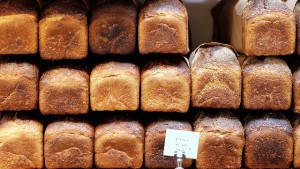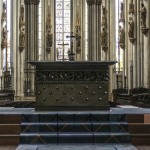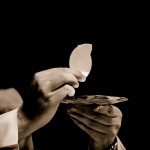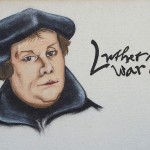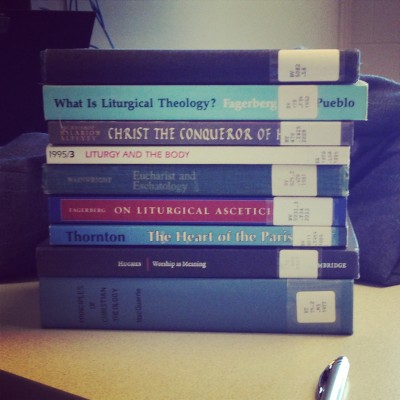(This sermon was preached at Epiphany Anglican Church on July 29, 2012 in Mission Viejo, CA. The lectionary lessons were from Track 1 of the RCL: 2 Samuel 11:1-15, Psalm 14, Ephesians 3:14-21, and John 6:1-21. My notes for this upcoming Sunday will focus on the lessons from Track 2.)
I love Star Wars. I grew up watching the movie, reading the books and playing the card game. In the first movie produced, Episode 4, the Rebel Alliance is under attack from the oppressive Galactic Empire with Senator-turned-Emperor at the helm. A ship carrying Princess Leia is about to be boarded in deep space by Darth Vader. The Rebel Alliance has been limping along since the Clone Wars when all of the Jedi – all but one – were killed. In a last ditch effort for survival, Leia sends a secret message to a relic of stability, Obi-Wan Kenobi. The message reaches Obi-Wan and the last three lines of the message read as follows:
“This is our most desperate hour. Help me Obi-Wan Kenobi. You’re our only hope.”
The Alliance had used up all of her energy, resources and connections. She only had one place to turn. Obi-Wan Kenobi was the last resort. The Alliance was in need of a game-changing event to get guarantee stability and survival. What needs do you have? How and where is God your only hope?
All of our lessons tonight deal with human need. Though we will focus primarily on John’s gospel, the common thread for us is that all of us are in need. We are in desperate need of something, but often we don’t know or recognize what it is that we need and why we need it. We often mistake our wants and desires as important needs. We allow our emotions to wreak havoc on our reason and distort our view of reality. There is hope, though. Our hope is found in the never ending, never failing, and always-faithful love and presence of God.
Before jumping into John’s gospel we need to answer a question that I’m sure you all have right now: what on earth happened to Mark? We were cruising through Mark’s gospel and then all of the sudden we do a jump, hop and a skip and end up in John. The feeling between the two couldn’t be more different. Mark tells the story of a very human Jesus who has a messianic secret. No one knows Jesus’ true identity until after his crucifixion. John, however, relates the story of a superhuman Jesus. There is no mistaking who Jesus is for John and his readers.
For the next 5 weeks we will be spending time in John 6. These five weeks will center on Jesus’ proclamation of being the Bread of Life and the Bread of Heaven. A couple of things to keep in mind: John is not Mark. We are going to encounter an entirely different type of gospel account with John. There is no Messianic Secret, Jesus is the Son of God and reveals himself consistently as such through his words and actions. If Mark has a low Christology then John has a high Christology.
Okay, history lesson over. Let’s look at John 6.
We open up with Jesus crossing the Sea of Galilee. A crowd was following him because they heard of his signs and they wanted more. His response to the crowds in this story is to go up to the top of the hill with his disciples. Throughout the gospel accounts, when the crowds begin to press in, Jesus retreats. This is not because Jesus is annoyed by the crowds. Far from it. In fact, he has compassion on the people. Jesus needed that time with the Father. Jesus withdraws twice in this story. The first time is to be with his team. In the midst of mission and ministry Jesus would not lose sight of his priorities. The Father always comes first.
The crowd begins to gather and John notes that it is shortly prior to the Passover Festival. Israel’s mind is already turning to the unleavened bread of the Passover and the story of Moses and the Exodus. It is no mere coincidence that Jesus is going to perform a miracle with bread and then speak of himself as bread.
As the crowd swells, Jesus turns to Philip and asks, “How are we going to do this?” The people need food and Jesus’ rag-tag army has none. John tells us that this is a test. Jesus knew what he was going to do. This is an example of the difference between John and Mark. Mark would have simply recounted the story based on fact, perhaps with some dramatic language thrown in, but he never would have intimated that Jesus knew he was going to perform a miracle. John, however, lets us in on the fact that Jesus is in total control, and knows exactly how he is going to handle this.
Philip answers from a purely financial and material position. 6 months wages would not be enough to feed this crowd. Remember, 5,000 is only the number of men in the group. The crowd may have been as large as 15,000 people. The barrier in front of Philip is self-imposed. He is thinking only in terms of what the world says we are able to do or offer.
It’s not that Philip is entirely misguided or wrong, but that his vision is limited by his human finitude. His only category for a large crowd in need of food is money. However, his categories will expand after the miracle Jesus performs because this miracle is revelatory of Jesus’ command over creation. Had Philip engaged this situation for a second time weeks later I’m sure his response would have been “Jesus, you can multiply this for us, right?”
Remaining consistent, Peter speaks up and offers up the food of a young boy. Commentators say that this was his lunch. But unless this boy was the 1st century equivalent of William, or me how many young boys do you know that could devour 5 loaves of bread and two fish? Anyway, Peter offers up the food and Jesus does something that is very familiar to us: he took the bread, gave thanks and broke it. This isn’t just familiar to us; it was also familiar to the Jews who were awaiting Passover. Jesus shares a grain-filled meal with the crowd, multiplying that which was provided, and in so doing points both back and forward at the same time. He points back to the sacred Pescha and points forward to what we will one day celebrate as the Eucharist. Indeed this meal of bread becomes the foundation for the rest of the chapter in which Jesus calls himself the Bread of Life.
After Jesus makes the miraculous meal, and everyone has had their share, there are 12 baskets of bread left over. I want to look at this more in depth in a minute, but for now suffice it to say that when God is at work there is always an abundance. We’ve said it before and we’ll say it again: our God is not the god or scarcity but of abundance. His are the cattle on 1,000 hills. The earth is his and everything in it. So of course there would be lots of leftovers after a miracle is performed.
Jesus and his disciples go away from the crowd. Why? Because the people wanted to make him a king by force. Remember that Israel was still awaiting Messiah and they thought that their Messiah would be a political leader, one who would not establish the Kingdom of Heaven but re-establish the nation of Israel. A second David if you will. Jesus is not that man. We know that Jesus is the King of Heaven, but he is not king in the sense that they want him to be. If you aim for a political Messiah then all you will get is disappointment. Yes, Jesus is Lord and Caesar is not, and yes his kingdom supersedes and trumps all other kingdoms and loyalties, but the Word made flesh came as the Faithful Israelite, the suffering servant and the humble king. Let us not make the same mistake as those in the 1st century.
They retreat to get away from the crowd. The disciples travel across the lake and Jesus spends time alone with the Father. Jesus needed that intimate time with the Father. He had compassion on the crowds and he poured into his disciples, but his priority was always with the Father. Do we ever lose sight of our relationship for the sake of doing more, ministering more, and teaching more? Just a thought…
Jesus begins to walk out to the disciples in the middle of the night. They are about three miles from his side of the shore. As he approaches them they see him and are afraid. The waters are rough and the wind is blowing, certainly causing more confusion and panic than necessary. Momentarily forgetting the great wonder they witnessed at supper time, they are afraid and call out to him. Jesus’ answer is priceless: it is I. The peace of God spoke peace over them.
John puts these two stories together for a reason. He is the only gospel writer to do so. There is something that he wants us to see in the need of the people for food and the need of the disciples for his reassuring presence. Well, I just gave it away. John is portraying for us two very different and yet the same types of need that we experience. As I said before, each one of our lessons discusses human need.
Here is what we need to know:
First, we cannot live the discipled life on our own. There is no such thing as a maverick or lone ranger Christian, that’s a complete oxymoron. We cannot live well the life of the disciple apart from God.
David is a prime example that sin is either our conscious decision or action to life as if God does not exist. David was the king of Israel who was a man after God’s own heart. He brought the Ark of the Covenant back to Israel and dance before the Lord. And yet he stayed behind when he should have gone out to war. He sent someone in his stead and while at home spies a naked woman. He sends for her, has sex with her, and then sends her home. Upon hearing of her pregnancy he goes to great lengths to get her husband back from war to sleep with her so that the child can be pinned on him. Uriah won’t go into the house the first night, he won’t be fooled after David gets him drunk the second night, and finally David resorts to killing him through battle. This is the king of Israel, God’s anointed through whom the royal line will live forever. How the mighty have fallen! And friends, we are no better. We too have sinned and fallen short of the glory of God. Or as the Psalmist said tonight, there is no one good, not even one. Why? Because we have all sinned. We have all lived and acted as if God does not exist.
The results of our rebellion are fatal. Apart from God there is no life. We cannot live God’s abundant life without God. Sin is proof that we cannot live alone.
Second, and here’s the good news, you are not alone. Just as Jesus walked out to the boat and calmed their fears by saying, “It is I” so too does he speak to us, to you, tonight and say, “It is I, do not be afraid.” The very fact that we are a church is made possible only through the Holy Spirit. Paul’s beautiful prayer over the Ephesians, a group of Jews and Gentiles made one, makes it clear that the Church only happens through the power of the Spirit. The true King of Israel – the one anointed by God alone and not man – is with you always, to the very ends of the age. Even when you walk through the waters and the flames.
See, our problem is not that we are in need of possessions. We live in one of the richest counties in the richest nation in the world. Half of the world’s population lives on less than $2.50 a day. We aren’t necessarily like the crowd swarming Jesus in need of food. No, we are more like the disciples in the boat who have already forgotten Jesus’ miracle and are in need of his presence. I want to reassure you of his presence, of his work in your lives. That’s the importance of Christian brothers and sisters. I may not be able to see what God is doing in my life, I may even doubt that he is there, but Rebecca can say, “It is He. Don’t be afraid.” Jeff can say, “I see him at work.” Etc.
You are not alone. Jesus reveals himself as Emmanuel, as God with us, in these stories and his presence meets our needs.
Third, we are meant to overflow. Jesus ended up with 12 baskets of bread after starting with only 5 loaves and 2 fish. The house of Israel was provided for in this meal. The imagery here is powerful: Jesus’ miracle here is a sign of things to come. All of Israel – the new Israel with both Jews and Gentiles – will be fed and satisfied by their Lord and there will be more. John tells us that a river will flow out of the New Jerusalem.
I want to suggest that our lives are to be like the overflowing baskets of God’s abundant provision, and that the overflow is not for our own benefit but for the benefit of others. To put it another way, the unity of the church for which Paul prays is for the life of the world. Our life together as a church, both as individuals and a community, is always to be lived to bring others into covenant relationship with God.
We can and should begin meeting the needs of others, extending the shalom of God by saying “it is He.” Here’s an example. Rebecca recently told me of a new mother who is suffering from Post Partum Depression. The mom is unable to bond with her child, unable to function throughout the day, and retreating from the world. Rebecca is part of a group of moms in OC who want to care for her. I think that we have an opportunity as well. What if you, as an individual or family, were able to work one more meal into your weekly budget? Could you purchase, prepare and deliver a cooked meal for a mom and family in need? The cost is tiny but the reward immense.
We often approach God in one of three ways: As a vending machine. This is based on convenience when we need him and when we have a craving or want. As a Night light – an emotional or psychological crutch. OR Almighty God – Emmanuel, God who is with us. John records for us the stories of Emmanuel, he is who we need desperately.
Try praying this prayer every day for the next month. Yes, I borrowed the language from Princess Leia. Truth is truth! But seriously, our need is not for manna or mammon, but for Emmanuel. This day is my darkest hour. Help me Lord. You’re my only hope. Our true need is for the presence of God to so permeate our lives that we bring others into his presence by our very words and deeds. We can say to those in need, “It is He. Don’t be afraid.” Amen.

